June 18, 2025 | 07:45 GMT +7
June 18, 2025 | 07:45 GMT +7
Hotline: 0913.378.918
June 18, 2025 | 07:45 GMT +7
Hotline: 0913.378.918
One of the most apparent indicators of General Secretary Nguyen Phu Trong’s concern for agriculture, farmers, and rural areas is the signing and promulgation of Resolution No. 19-NQ/TW, dated June 16, 2022, of the 5th Conference of the 13th Party Central Committee on agriculture, farmers, and rural areas to 2030, with a vision to 2045.
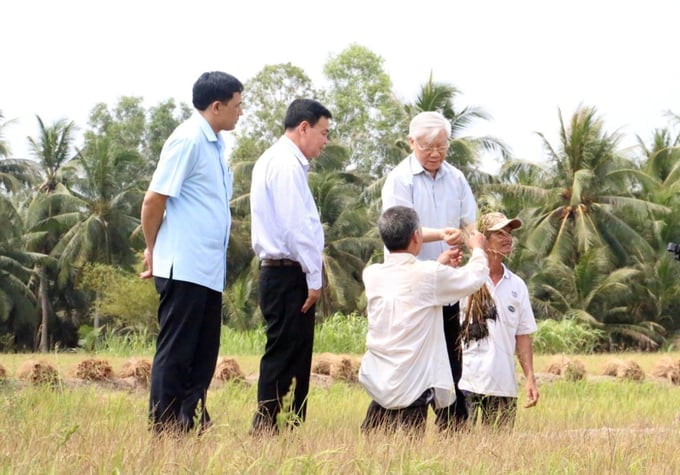
General Secretary Nguyen Phu Trong visited and shared the difficulties and losses that farmers in Giong Tom district, Ben Tre province encountered when their rice fields dried up due to saltwater intrusion in March 2016. Photo: Dong Khoi.
In Resolution 19-NQ/TW issued by the General Secretary, for the first time, the Party identified agriculture as a national advantage and a pillar of the economy.
The clear viewpoint is to develop agriculture effectively and sustainably, integrating multi-values towards increasing added value, competitiveness, associated with promoting the development of the processing industry, post-harvest preservation, and expanding agricultural product markets both domestically and internationally; ensuring food safety, national food security, protecting the ecological environment; encouraging the development of green, organic and circular agriculture.
There is a strong shift in mindset from viewing agriculture solely as production to seeing it as agricultural economic development aligned with market demand. The resolution advocates for leveraging regional and local advantages, organizing agricultural production and business according to the value chain, and basing development on science, technology, and innovation.
In addition, the resolution outlines tasks and solutions for achieving effective and sustainable agriculture in an ecological direction, applying advanced science and technology, and improving quality and added value.
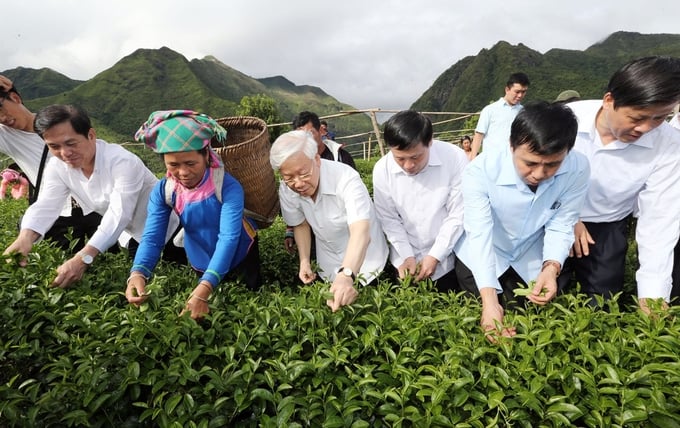
General Secretary Nguyen Phu Trong inspected the intensive model of high-quality tea production according to VietGap standards in Coc Phat village and participated in tea picking with people in Ban Bo commune, Tam Duong district, Lai Chau. Photo: Tri Dung.
Restructure agriculture substantially and effectively by exploiting and leveraging the advantages of tropical agriculture and the potential and benefits of each region and locality. Promote land accumulation and concentration; guide agriculture towards modern practices, specializing in large-scale commodities while ensuring food safety through advanced science and technology, digital transformation, mechanization, and automation. Forge strong links between agriculture, industry, and services, integrating production with preserving, processing, and consuming agricultural products. Encourage the development of green, organic, and circular agriculture, support the One Commune One Product (OCOP) program, and work to reduce greenhouse gas emissions. Continue to invest in and upgrade agricultural production infrastructure, focusing on projects that support agricultural restructuring and climate change adaptation.
Develop high-yield, high-quality, disease-resistant plant and animal varieties that adapt to climate change. Preserve and enhance high-value indigenous varieties and establish mechanisms to encourage research, selection, and creation of new varieties by institutes, schools, and enterprises. Increase self-reliance in animal feed production and advance research and technology for producing vaccines, veterinary drugs, pesticides, equipment, and agricultural supplies. Reorganize output, boost the farm economy, and strengthen the cooperative economy by focusing on cooperatives and agricultural enterprises. Foster linkage and cooperation along the value chain to enhance added value. Develop specialized technical systems for veterinary medicine, plant and animal protection, quarantine, and food safety management. Manage the quality of agricultural supplies strictly and improve disease prevention and control effectiveness. Build safe and high-quality food supply chains and address violations in agricultural material production and food safety with strict enforcement.
The Resolution targets achieving an average GDP growth rate of about 3% per year for the agricultural sector by 2030 and increasing agricultural labor productivity by 5.5 - 6% annually.
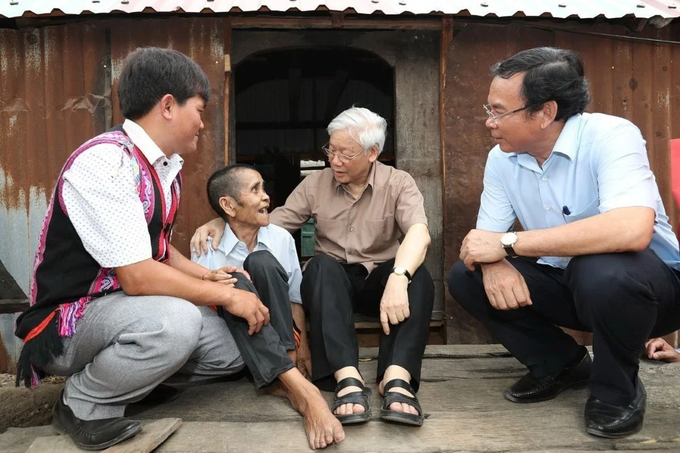
General Secretary Nguyen Phu Trong visited the family of war veteran Dinh Phi, a household in especially difficult circumstances in Tung Ke 2 village, Ayun commune, Chu Se district, Gia La province, during a working trip to the Central Highlands in April 2017. Photo: Tri Dung.
On December 26, 2023, at the 8th Congress of the Vietnam Farmers' Union for the term 2023-2028, the General Secretary delivered a profound speech on agriculture, farmers, and rural areas.
The General Secretary recalled President Ho Chi Minh’s words: "If our farmers are rich, our country will be rich. If our agriculture is prosperous, our country will be prosperous." He also emphasized, "Farmers are a vital force of the nation and a loyal ally of the working class. To succeed in the resistance war and build the country, we must rely on the strength of the farmers." President Ho Chi Minh's ideology remains a central thread in our Party's approach, profoundly integrated and creatively applied throughout our revolutionary leadership.
Today, our Party and State recognize agriculture as a national advantage and a pillar of the economy. Farmers and rural areas hold a strategic position in industrialization, modernization, and the construction and protection of the Fatherland. They form the foundation and crucial force for socio-economic development, political stability, security, and national defense. They also play a key role in preserving and promoting national cultural identity and protecting the country’s ecological environment.
In response, many policies and guidelines have been issued to advance agriculture, farmers, and rural areas. These include: "Integrating the development of the peasant class with agricultural advancement and the industrialization and urbanization of rural areas, ensuring that rural residents can transition to urban life without causing large-scale migration"; "Restructuring agriculture to develop ecological agriculture, modern rural areas, and civilized farmers"; and emphasizing that "farmers are the central focus of the agricultural development process, with the rural economy closely tied to new rural construction."
The question arises: in the current context, what are the advantages and disadvantages of developing ecological agriculture? What changes must farmers make in their thinking and actions to truly become the focus of agricultural development and rural economic growth in line with new rural construction?
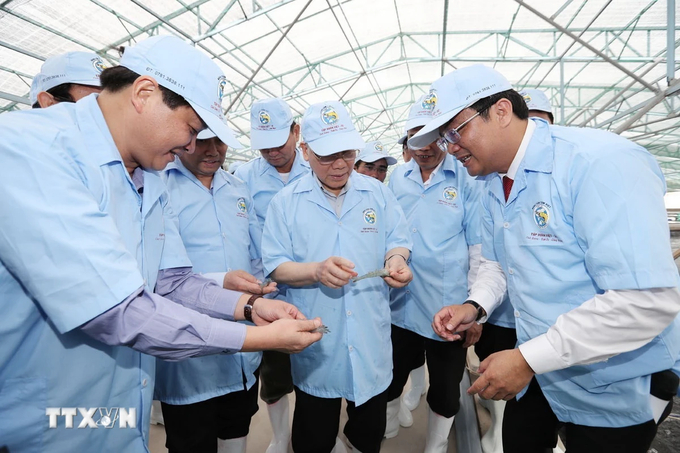
General Secretary Nguyen Phu Trong visits the shrimp farming model in a closed house of the Viet Uc - Bac Lieu Joint Stock Company in Vinh Thinh commune, Hoa Binh district (February 2017). Photo: Tri Dung/VNA.
The rural must be a livable place
Through Resolution 19-NQ/TW and his speeches, General Secretary Nguyen Phu Trong consistently asked: How can we develop agriculture effectively and sustainably, enhance agricultural products' added value and competitiveness in domestic and international markets, and maintain it as a national advantage and economic pillar? How can we ensure that farmers truly become the central figures in agricultural development, rural economic growth, and new rural construction, with their qualifications and material and spiritual lives improving alongside the country's development, while enjoying the benefits of socio-economic progress and accessing urban services? How can we transform the countryside into a modern, prosperous, and happy place, with a green, clean, and beautiful environment, a vibrant cultural life steeped in national identity, and guaranteed political security, order, and social safety? How can we make the countryside a place people long to return to, even if they are far from home?
“Achieving the vision of 'ecological agriculture, modern countryside, and civilized farmers' requires determination, consensus, and the active participation of the entire political system and society,” affirmed General Secretary Nguyen Phu Trong.
In Resolution 19-NQ/TW, our Party clearly defined the goal: to build a modern, prosperous, and happy countryside with comprehensive economic and social infrastructure; a green, clean, and beautiful environment; a vibrant cultural life rich in national identity; and ensured political security, order, and social safety.
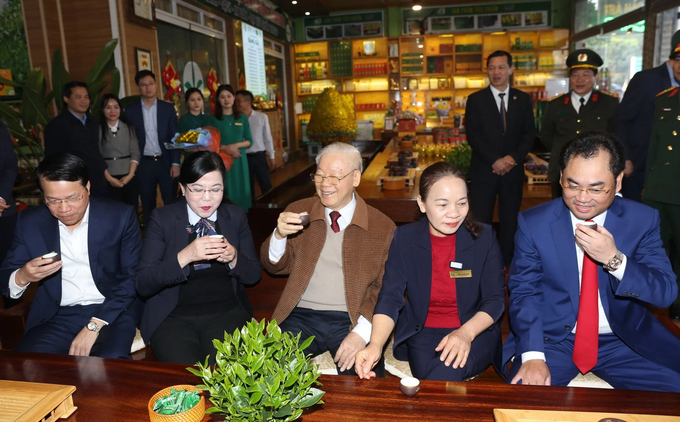
General Secretary Nguyen Phu Trong enjoyed Tan Cuong tea, Thai Nguyen, in January 2023. Photo: Quang Vinh.
Agricultural and rural development must integrate tangible and intangible cultural heritage, preserving the values of rice civilization and national cultural identity. Planning for rural socio-economic development should focus on harmonizing and synchronizing agriculture, industry, and services. This includes labor restructuring, creating local livelihoods and jobs, increasing incomes for farmers and rural residents, ensuring national defense and security, and strengthening the grassroots political system, particularly in strategic, remote, border, island, and ethnic minority areas. New rural areas must be developed deeply, effectively, and sustainably.
We need to manage and use land and water resources efficiently and economically, protect the environment, conserve biodiversity, and ensure sustainable ecosystem development. Proactive measures must be taken to prevent and combat natural disasters, adapt to climate change, and ensure agricultural production and public safety.
“Our Party has recognized that 'Agriculture, farmers, and rural areas are interrelated, closely linked, and indispensable; and play a crucial role in our cause of innovation, building, and defending the Fatherland.' We must make every effort to achieve these goals,” instructed General Secretary Nguyen Phu Trong.
Translated by Quynh Chi

(VAN) According to the Binh Thuan Department of Industry and Trade, in the first five months of 2025, Binh Thuan's dragon fruit export turnover increased by 20.65% compared to the same period last year.

(VAN) EU countries on Thursday gave final approval to new tariffs on fertilizer imports from Russia, a move aimed at cutting off revenue that could support Moscow’s war in Ukraine, despite concerns from European farmers.

(VAN) The working delegation from the Ministry of Agriculture and Environment conducted an important trip to the Netherlands to strengthen strategic partnerships and sustainable development in the agricultural sector.

(VAN) The letter ‘A Plea from the Ocean’ not only evokes emotion but also awakens the human conscience to the responsibility of protecting life on Earth.

(VAN) The Department of Agriculture in South Africa has announced the country’s first mass vaccination of poultry to prevent local birds from contracting avian influenza.

(VAN) Establishment of the Mekong Delta Regional Agricultural Linkage Center, aiming for a closed value chain, deep processing, trading platforms, and international market connectivity.

(VAN) Gia Lai province has recently recorded 460 rare species of animals and plants, contributing to forest conservation and biodiversity planning in the region.